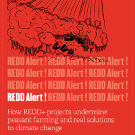How REDD+ projects undermine peasant farming and real solutions to climate change (GRAIN and WRM)
GRAIN and World Forest Movement / October 2015
 This report argues that REDD+, a mechanism to reduce emissions from deforestation and forest degradation, is a “not a solution to climate change” and instead locks in the existing model of industrial agriculture which is one of the drivers of deforestation and therefore contributing to climate change.
This report argues that REDD+, a mechanism to reduce emissions from deforestation and forest degradation, is a “not a solution to climate change” and instead locks in the existing model of industrial agriculture which is one of the drivers of deforestation and therefore contributing to climate change.
“The reality is that REDD+ programmes put the blame for deforestation and emissions on peasant farming practices that have nothing to do with climate change. REDD+ projects also undermine local food systems by preventing traditional farming practices and restricting people’s access to lands and forests.”
“At the same time, large-scale drivers of deforestation, like industrial logging, infrastructure mega-projects, mining, large hydro-dams, and, above all, industrial plantations for trees, oil palm or soybeans, continue without restriction.”
The publication provides examples from Mozambique, Nigeria, the Democratic Republic of the Congo, Madagascar, Brazil, Indonesia, Peru, Uganda and Kenya to illustrate five key patterns that make REDD+ so harmful for peasant communities. These include:
1) How REDD+ blames peasant farming practices for deforestation and emissions;
2) How REDD+ rarely benefits local communities but is good business for carbon companies, international conservation NGOs, consultants and industrialised countries;
3) How REDD+ undermines food sovereignty;
4) How REDD+ undermines community control over territories;
5) How REDD+ facilitates the expansion of corporate agriculture.
The report concludes:
REDD+ is not just a false solution to the urgent and critical problem of climate change. It reinforces the corporate food and farming system that is largely responsible for climate change, has robbed many communities and forest peoples of their territories and undermines the food and agricultural systems of peasants and indigenous peoples that can cool the planet.
Peasants are already proving that it is possible to ‘feed the world’ without the massive emissions produced by the export-led, industrial model of agricultural production. Giving lands back to small farmers and indigenous peoples is the most effective way to deal with the challenges of feeding a growing global population in an era of unpredictable climate change.
Read report
————————————
This summary was prepared by Why Green Economy?. The views expressed have been paraphrased. See the original source for more information.

Leave a Reply